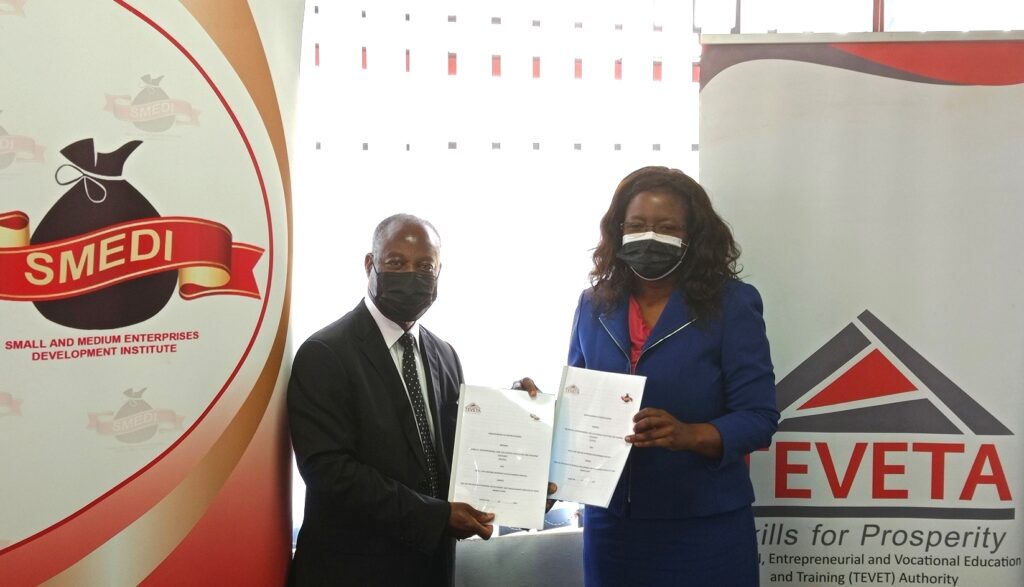By Sylvester Kumwenda

Lilongwe, September 7, Mana: The Technical, Entrepreneurial and Vocational Education and Training Authority (TEVETA) and the Small and Medium Enterprises Development Institute (SMEDI) have entered into a partnership that aims at helping develop small scale entrepreneurs in the country.
The Memorandum of Understanding (MOU) of the partnership took place Tuesday in Lilongwe and it is targeting 2000 TEVETA graduates in the course of the next three years.
The overall goal is to equip the TEVET beneficiaries venturing into entrepreneurship with the required skills to effectively establish, run and maintain their businesses for both their personal and economic growth of the country.
TEVETA Board Chairperson Don Whayo after the signing ceremony said as the country is grappling with alarming levels of unemployment, entrepreneurship is proving to be a viable alternative to wage employment.
“TEVET sector releases 7,400 graduates every year who are potential entrants onto the Small and Medium Enterprise (SME) sector.
“However, only a limited number establish and sustain successful businesses because they lack a number of things, among them, business development services, business management services and mentors and coaches. This is where the MOU comes in,” said Whayo.
In the agreement, TEVETA will be responsible for identifying and recommending TEVET beneficiaries to SMEDI for business development and management services after finishing their trainings.
Also, it will facilitate TEVET up-skilling interventions for SME’s and ensure that the general public is made aware of the existence of the TEVET graduates incubation programme amongst other things.
SMEDI on its part will, amongst other things, be offering business incubation services, mentorship and coaching, business management training and facilitating access to markets for these TEVET beneficiaries.
“At the end of the three-year span of the MoU, both parties expect that at least 2,000 TEVET beneficiaries will be trained in business management, at least 1,000 will access coaching and mentorship programmes and at least 500 to be linked to markets and financing institutions.
“Also we project that at least 63% of the TEVET beneficiaries that access business development services will be running sustainable enterprises,” said Whayo.
In her remarks, SMEDI Board Chairperson Temwani Simwaka said the development brings together two formidable partners, one which provides technical and entrepreneurship trainings and one which is oriented towards business development.
“As you can see, the two institutions are really supposed to work together to enable the establishment, growth and certification of SMEs, so that they may be able to provide quality services and products to government, private institutions and Malawians as a whole,” said Simwaka.
She subsequently called for more efforts to develop and promote small and medium entrepreneurs in Malawi who have enhanced vocational, entrepreneurial and business skills, and also taking on board youth and women.
“Research has shown that where men and women work together in equal partnership, growth is faster than where you only have men doing all the work.
“So for our country to grow faster and be able to create wealth and employment, we definitely need women to come to the party,” she said.



… [Trackback]
[…] There you will find 97477 more Infos: malawivoice.com/2021/09/07/teveta-partners-smedi-in-small-entrepreneurship-development/ […]